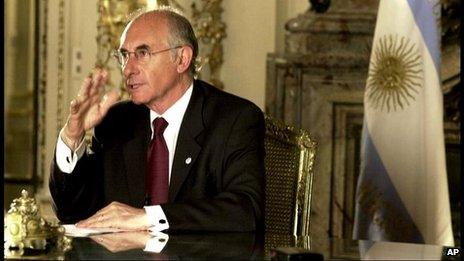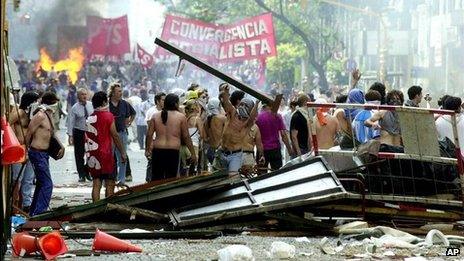Argentina prosecutors seek jail for de la Rua
- Published

Mr de la Rua resigned in 2001 after days of violent protests and left the presidential palace in a helicopter
Prosecutors in Argentina have asked for a six-year prison term for former president Fernando de la Rua.
He has been accused of paying some $5m (£3m) to a group of senators for them to vote in favour of a controversial labour reform bill in 2000.
Five former opposition senators are also facing six-year prison sentences over the scandal.
Mr de la Rua, 76, denies all the charges and says the accusations against him are politically motivated.
The trial began in August and a verdict is not expected until next year.
More than 300 witnesses are expected to testify, including President Cristina Fernandez de Kirchner, who voted against the bill and is not accused of taking a bribe.
Helicopter escape
A key witness is Mr de la Rua's former parliamentary secretary, Mario Pontaquarto, who pleaded guilty and agreed to collaborate with prosecutors.
Prosecutors have asked for an 18-month suspended jail term for him.
Mr Pontaquarto accused the president of giving him orders to offer the bribes to a group of senators to make sure the measure was approved.
The legislation was controversial as it scrapped many rights of Argentine workers.

A state of siege was declare to try to put an end to the protests
It was eventually approved, but revoked two years later.
The International Monetary Fund (IMF) was at the time demanding public sector cuts from the government as a pre-condition to approve new loans.
The crisis got worse as the end of 2001 approached. Angry protests took place on the streets after the banks refused to let customers withdraw their deposits.
Mr de la Rua ended up encircled by angry protests at the presidential palace, the Casa Rosada.
He resigned on 20 December 2001 and left the presidential palace in a helicopter.
Last year, a high court in Argentina dismissed homicide charges against Mr de la Rua over the riots, in which more than 20 people were killed.
The court ruled as legitimate his decision to declare a state of siege to deal with the protests.
- Published15 August 2012
- Published27 December 2012
- Published28 June 2011